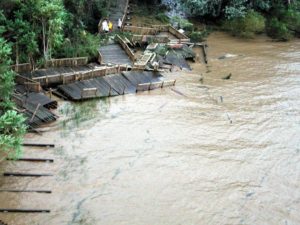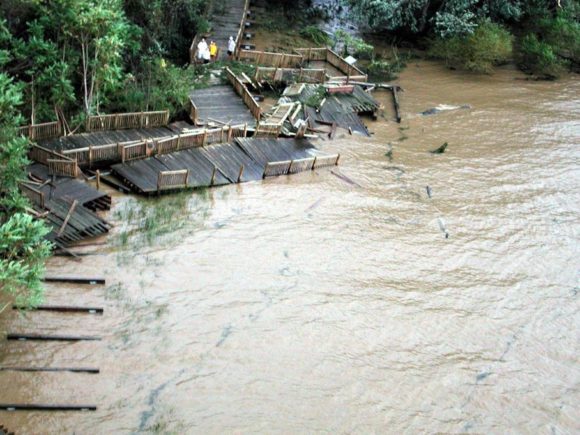A measure approved by Virginia voters this week to cut taxes on homes in flood-prone areas of the flood-prone commonwealth has climate experts warning that it might encourage people to remain in vulnerable areas – and could spread to other states.
The constitutional amendment passed Tuesday with more than 70 percent of the vote allows cities and other local governments to cut taxes on homes that repeatedly flood, providing the property owners take protective steps. Supporters say the change will keep residents from abandoning coastal communities that are increasingly deluged.
That’s what worries some climate policy advocates.
“It will be an incentive to stay in a risky area,” said Chad Berginnis, executive director of the Association of State Floodplain Managers, adding that other states could follow. “This is potentially a big deal.”

Climate change is making the problem more acute. By 2030, as many as four communities in coastal Virginia, including Chesapeake and Poquoson, will experience what the Union of Concerned Scientists characterizes as “chronic inundation,” meaning that at least 10 percent of their land area will be underwater an average of twice a month. That number is expected to grow to as many as seven communities by 2045, and as many as 38 by 2100.
Still, Berginnis said that until Washington does more to help people in coastal areas over the long run – for example, buying and demolishing more homes that keep flooding – the benefits of Virginia’s approach outweigh the risks, by making it cheaper to protect homes while they’re still standing.
“You need short-term solutions, and you need long-term solutions,” Berginnis said.
Congress so far hasn’t agreed on a long-term approach. The House last year passed a flood insurance bill that would prevent homes that keep flooding from getting federally subsidized coverage. The Senate didn’t take up the bill.
The Virginia measure passed Tuesday would let cities, towns and counties exempt their most vulnerable homeowners from part of their property tax burden. In return, those homeowners would have to take steps such as elevating their houses, which may slow the rate at which those properties decline in value.
The Virginia legislature must now pass enabling legislation setting the rules for tax breaks. State Senator Lynwood Lewis, Jr., who represents Norfolk and sponsored the amendment, said he hopes to give local governments as much leeway as possible. But he said he doesn’t want the exemption to apply to new buildings. “That is not at all the intent,” Lewis said in a phone interview Thursday.
Lewis said the change was unlikely to make a difference in whether people choose to stay in flood-prone areas, arguing that many of those homeowners are middle-to-low income and don’t have the money to move.
“The idea that they’re even going to be in a position to abandon is just not realistic,” Lewis said. Flooding could eventually force residents to leave some areas, but that’s a decision for local governments to make, he said.
‘Buying Time’
The measure won the backing of some Virginia environmentalists. Skip Stiles, executive director of Wetlands Watch, said his group supported the policy, on the grounds that it would delay the collapse of local tax bases in flood-prone areas long enough to find a more durable solution.
“It’s true that we want to move people out of flood plains, especially those that are getting hammered the worst. But who’s going to pay for that?” Stiles said in a phone interview. “If those houses go belly up and have to be bulldozed, there’ll be no money.”
By contrast, Stiles said that providing financial incentives to keep people living in flood-prone homes would provide some space for governments to come up with better ideas.
“You’re keeping the property tax base intact,” he said. “You’re buying time for a transition.”
National groups were less enthusiastic. R.J. Lehmann, director of insurance policy at the R Street Institute, a Washington-based think tank that advocates free-market solutions to climate change, said the change would dim the financial signals warning people not to live in flood-prone areas.
“It’s a convoluted way to accomplish the goal of encouraging mitigation,” Lehmann said. “I just would be more comfortable with a direct means-tested subsidy for those who need help affording improvements, rather than mucking around with the tax code.”
Other states could follow, he said. “It wouldn’t surprise me if it caught on, given rising concern about flood risk.”
Shannon Cunniff, director of coastal resilience for the Environmental Defense Fund, which didn’t take an official position on the amendment, said it’s hard to say whether the tax breaks would in fact succeed at encouraging people to protect their homes against flooding.
“Folks that do risk-reduction improvements already have financial incentives,” Cunniff said, including preventing their property value from falling and reducing their flood-insurance premiums. “What I’d like to see is another complementary program focused on encouraging folks to move out of repetitively flooded properties to less risky areas.”
Aaron Clark-Ginsberg, who lives in Alexandria, Virginia, said he was torn over the measure when he voted Tuesday.
“It’s totally a great idea to help people protect themselves from flooding,” Clark-Ginsberg, a social scientist at RAND Corp. who focuses on disaster policy, said in a phone interview. On the other hand, he said, “My worry is that you’re basically incentivizing living in flood plains.”
In the end, Clark-Ginsberg said, he voted against the measure. Still, he acknowledged that, politically at least, offering tax cuts had broader appeal than some of the alternatives.
“It’s a lot easier to give an individual a little bit of money than it is to address some of the broader systemic issues,” Clark-Ginsberg said.
Was this article valuable?
Here are more articles you may enjoy.


 Poll: Consumers OK with AI in P/C Insurance, but Not So Much for Claims and Underwriting
Poll: Consumers OK with AI in P/C Insurance, but Not So Much for Claims and Underwriting  Beyond the Claim: How Social Canvassing is Transforming Insurance Fraud Detection
Beyond the Claim: How Social Canvassing is Transforming Insurance Fraud Detection  Zurich, Philadelphia, Others Ordered to Pay $345M to Cover Abuse Charges at Georgia School
Zurich, Philadelphia, Others Ordered to Pay $345M to Cover Abuse Charges at Georgia School  EVs Head for Junkyard as Mechanic Shortage Inflates Repair Costs
EVs Head for Junkyard as Mechanic Shortage Inflates Repair Costs 